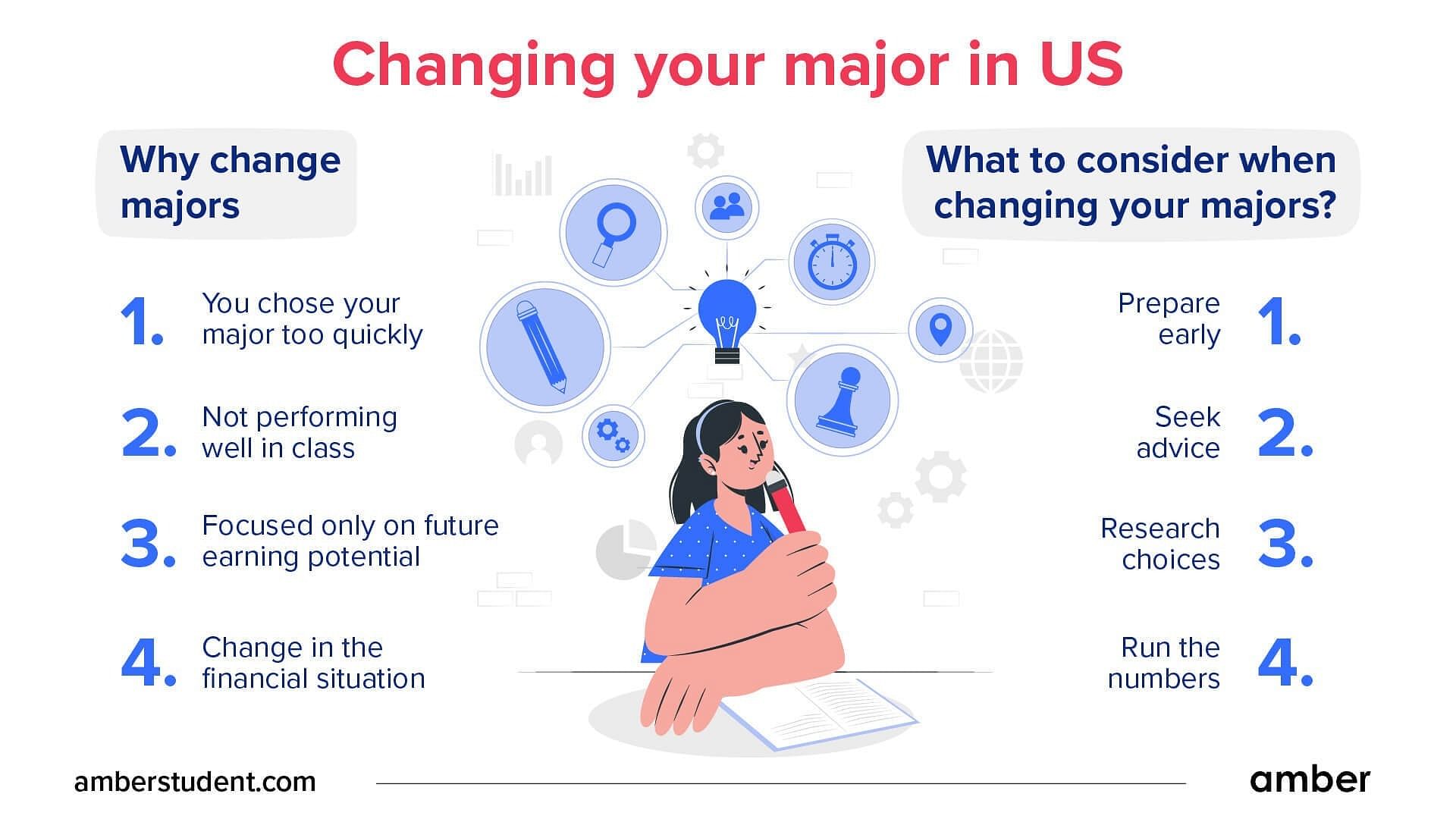Picking a college major is a tricky task. Anyone would be overwhelmed by the sheer number of majors offered at a university, let alone the typical 18-year-old entering student. In the USA, your major (or study programme) dictates the classes you attend, the academic requirements for graduation, and most crucially, your career future. But what happens if you are unhappy with your major? We’d say fear not because many US universities and colleges allow you to change your major! Here's all you need to know to change your major.
Can you change majors in college?
College students can change their majors in many cases. They decide to do this when their interests change or when they are not satisfied with their current major. Some students also choose to switch majors for a more fulfilling career path. To determine if this is the right choice for your college education, it is important to understand why you are considering changing your major. Before making the change, you must check with your advisor to determine if you can change your major. Remember that different departments have different admissions and transfer requirements, and financial aid could also be affected.
When is the best time to switch your major?
While in school, you can typically switch your college major at any time. However, it is important to consider the drawbacks before deciding, particularly if you decide to change majors later on. This can lead to additional time in college, leading to higher college costs such as extra tuition. Before taking any steps to switch your college major, make sure to weigh the potential drawbacks.

What Are the Pros and Cons of Switching Majors?
Switching your major can have both good and bad implications. Here are some of the pros and cons of switching your major:
Pros of switching your major:
1. Do what you love.
Switching your major directly means that you are pursuing what aligns with your passion and true interests. This will help you reach the pinnacle of your career as you are much more inclined towards the subject and field of study.
2. Improve career decisions.
By choosing the right major, you can ensure that you are pursuing what really fits your personality. This move also ensures that you explore different fields while kindling your skills, interests and passion for a certain domain.
3. Personal Growth
Choosing a major, you love can help you grow as a person. Realising what you really want to do in life can be a journey to self-discovery, thus leading you to self-growth. This can also lead you to self-actualisation. Understanding what you really wish to pursue and practising can help you grow both personally and professionally.
Cons of switching your major:
1. Extended Time
Sometimes, as you change your major, you might need to cover up on some extra coursework, making it time-consuming. This also takes much more time for graduation than it would have originally taken.
2. Lost Course Credits
As you earn credits for each course, if you decide to change your major, you might have to lose some of the credits you earned in your previous major. Basically, choosing a new major means that you might have to start from scratch.
3. Financial Constraints
Sometimes, choosing a new major can be financially exhausting as the tuition fees for that particular course might differ from what you had previously chosen. This is a very substantial point that each and every student should keep in mind before deciding upon changing their major.
3 Reasons to Change Your Majors
Choosing a more appropriate field of study can be the best thing you've ever done, whether you're a transfer student, a new freshman, or a student who is almost in their senior year. By changing your major, you can find your most authentic self and a more fulfilling career.
1. You chose your initial major too quickly.
You might decide on a major based on recommendations from friends and family members, or you might be committed to one major that you first believed would be a good fit. However, after arriving on campus and enrolling in a few classes, you might realise that your intended major is unsuitable for you and that you are now keen to explore other academic fields.
2. You are not performing well in class.
It may be a sign that you do not like the subject if you are not driven by the courses required for your major. Your degree should have a major that interests you and motivates you to keep learning, which will show in your grades. It could be time to switch to a major that better suits your potential and skills if you don't feel this way about it and your grades are slipping.
3. You chose your major based only on your future earning potential
Many students choose majors with high prospective incomes because they want to pursue lucrative careers after graduation. Aptitude and passion are crucial considerations while picking major and potential earnings. If your primary motivation for continuing your degree is to increase your financial stability, you should consider other career options.
3 Reasons NOT to Change Your Major
If you find yourself unsure about whether changing your major is the right decision, consider these points to help you understand the important factors that may suggest sticking with your current major.
1. Changing your major can be a lengthy process.
Changing your major can be a lengthy process from the university’s side. It might include lots of unwanted paperwork. Also, it may lead to delayed graduation. Changing majors can need you to take up extra coursework, meaning you would have to spend extra time in the university to cover up the work and assignments for the new major.
2. Financial Implications of Changing Major
Always check if you have the financial capability to pay for the new major or not before switching. Sometimes, the new major’s fees can be a lot more than the one you previously opted for. This can result in increased tuition fees, thus hiking your overall cost of education and other expenses. Check what are the financial implications of this decision.
3. Uncertainty & Decision-Making Pressure
Choosing a new major can also bring you unwanted pressure where you may feel confused. This is a stressful task which needs to be executed very carefully keeping in mind both pros and cons of the decision you are about to make. The self-doubt of whether you are making the right decision or not may also appear, which can outweigh your liking or inclination towards a certain thing. Therefore, it is important to be very aware and certain of your decision.
Popular Online Programs
Universities and institutions across the US provide numerous online or virtual courses like MOOC to their students. This is a great substitute for those who are in a dilemma to choose a completely new major. This can save the students a lot of time and effort from going to waste, as the process of changing a major can be a bit tedious. This will also help the students in developing valuable skills apart from their core subject or domain and exploring new dimensions without having to break the flow of their main area of interest. Here are some of the online programs in the US that can act as a great substitute for changing a major in the US:
1. Introduction to Computer Science
2. Data Science and Analytics
3. Digital Marketing
4. Introduction to Psychology
5. Entrepreneurship
6. Introduction to Environmental Science
7. Introduction to Graphic Design
8. Introduction to Web Development
9. Introduction to Artificial Intelligence
10. Introduction to Public Health
Key Questions to Ask Before Changing Majors in College
Deciding upon changing your major in college? Here are some of the factors you might wish to consider while asking these key questions yourself:
Can You Reach Your Goals With Your Current Major?
Always evaluate whether your current major is more aligned with your career goals. Whether it can actually help you in achieving your long-term aspirations. If it provides you with the necessary knowledge and skills, do consider going forward with it. This can be done without changing your major.
Will Changing Majors Affect Your Graduation Date?
If the new major is expecting you to put in extra effort and take extra courses, then it might impact your graduation date.
Can You Double Major or Add a Minor Instead?
Explore the possibility of whether you can add another major to your existing major or add a minor that can supplement your need to choose another course or subject altogether. This will end up saving a lot of time for you than you changing your major. you can still make it to your graduation on time. This can also be done without you having to change your major.
Will Changing Majors Cost You More Money?
When you choose a different major, your cost and fees might change. This may lead to increased tuition fees and thus may hike your educational expenses. Ensure you have the right financial aid to support this hike.
When Can You Change Majors?
In the majority of US schools and universities, you have the option to change your major during your first year of study. This is a great opportunity for you to try out different courses and find the field that suits you, as your first year is typically spent exploring various subjects through general education courses and becoming familiar with campus life. Some universities also allow you to switch majors during your second year.
However, it's less common, and US higher education institutions usually have strict rules against changing your major in your third year, as by this time, you are supposed to be focusing on specialised courses for your field of study. To ensure that you meet any potential deadlines and to avoid taking extra or unnecessary classes, it's important to speak with your university counsellor. The sooner you can change your major, the better for your chances of graduating on time and for saving money.
How to change your major: 5 Essential Steps
It is important to remember that each US university and college has its unique requirements for changing your major. Some might require you to complete an online application through a website, while others might need approval from a particular university department with its own documentation. You may also be required to meet certain criteria, such as a minimum/maximum number of credits earned.
When considering changing your major, it is important to have a plan in place. The process of switching your college major is not difficult, but it is important to take certain steps to ensure you are making the best decision for yourself. The following steps can help guide you through the process of changing your college major.
1. Meet With an Academic Advisor
To determine which major best suits your goals and interests, speak with an academic advisor. They can provide advice and information on any majors you are considering. For example, you might talk to an advisor about switching to a health or business-related major, depending on your career aspirations. When speaking with an academic advisor, make sure to find out as much as possible about the major you want to switch to. If you are interested in more than one, your academic advisor can help you make a decision.
2. Talk to Career Services
Talking to career services can actually be quite beneficial as it might provide you with an expert perspective on certain things. They might help you explore several career options and make you understand the industry prospects and job trends. Career services can also help you assess your transferable skills and help you identify how and which of the skills from your previous major can be applied in your new field. They might help you in networking for internships and job opportunities and additionally help you in planning a long-term career.
3. Be Aware of the Requirements for a New Major
When switching majors, it's important to be aware of the requirements for the new major. Depending on the major you are switching to, you may need to meet a new set of requirements. This is usually the case if you plan to major in a completely different field, such as changing from education to health. However, if your new major is in the same area as your current one, you may only have a few new requirements to meet. Hence is it always suggested that you take the classes in your new major before you switch to see if it aligns well with your likes, interests, and goals. Wondering which majors to choose? Check out our A Student's Guide to STEM Majors and 10 Best Majors For The Future 2023!
4. Learn From Current Major
To begin the process of changing your major, take a look at the available majors at your school. If you already know which major you want to switch to based on your interests and career goals, that's great. However, some students may be unsure about which major to change to. If this is the case, take the time to explore the different majors offered at your school. You may discover you have a strong interest in a specific major or that you are interested in more than one. To make a decision, seek guidance.
5. Take Classes in Your New Major
When you have determined which major you want to switch to, select classes that count towards that major. You may have taken courses that count towards it already, thus avoiding spending extra time earning your degree. However, if you are changing to a major in a different field, you may have to start over by taking classes towards this new major. This may result in needing to take an extra semester to graduate. This not only requires extra time but it also costs extra tuition money. Confused as to which major to choose after changing your major? Here is our detailed blog to help you choose the major that is perfect for you.
Things To Consider Before Switching Majors
First, you need to know that F-1 students can change their majors. Regulations in the United States don't call for government approval to modify or introduce academic majors. However, J-1 students are not allowed to change academic majors.
1. Prepare early
Considering your choices early in your studies is crucial because changing your major is ideal in your first or second year.
2. Speak with an adviser
You don't have to go through this process alone. You can discover more about your possibilities for changing your major at your university by speaking with an academic advisor. They can also assist you in narrowing down your declared major and exploring a wide range of choices.
3. Research your major choices
There can be certain activities or enrollment requirements for some majors. Make sure you thoroughly research each major to ensure that you are qualified and are ready for it (or will be able to qualify).
4. Run the Numbers
Compared to your current course of study, some majors may offer higher or reduced university fees. Work with your advisor and the institution to better understand your financial duties and control expenses.
5. Lastly, do not panic!
Figuring out your future can take time. Around 1 in 3 college students change majors on their way to earning a bachelor's degree, and 1 in 10 undergrads change their major more than once. There are around 17 million undergraduate students in the U.S., meaning millions of them switch majors yearly. It is entirely OK and possible to switch majors to one that genuinely interests you. In this chaos, don’t forget to make the most of your time studying in the US.
Compared to your current course of study, some majors may offer higher or reduced university fees. Work with your advisor and the institution to better understand your financial duties and control expenses. Also before even studying in the USA, you need to get a place to live and amber will help you find the perfect place next to your college!






.jpg)




.jpg)
.jpg)


.jpg)





